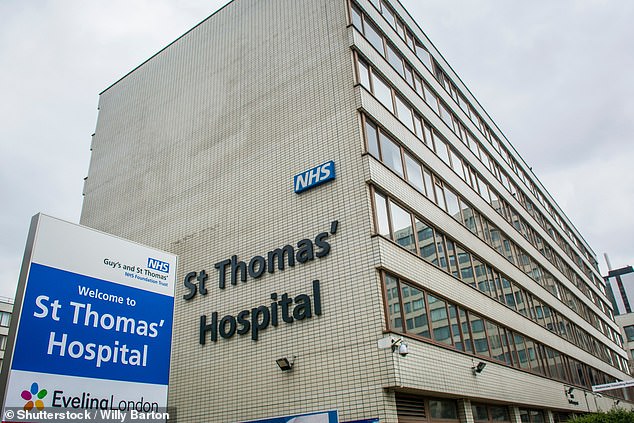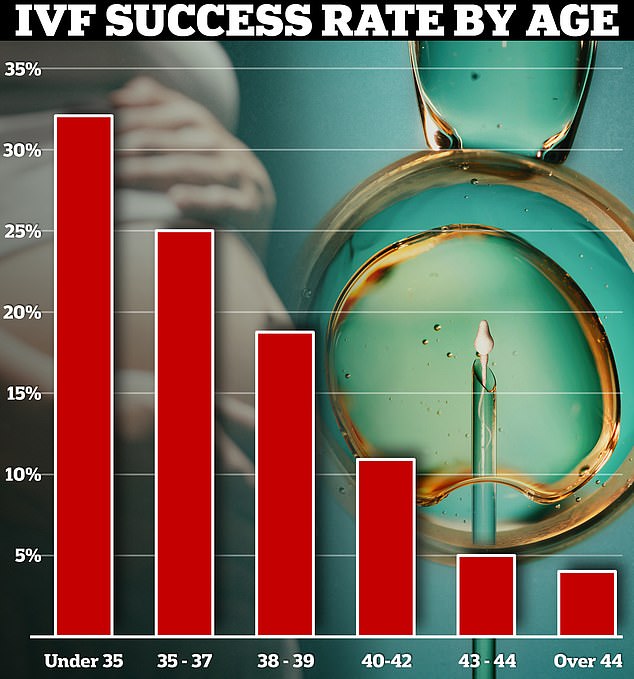‘It was devastating’: One of 130 women at prestigious NHS fertility clinic whose eggs were destroyed by ‘horrific’ mistakes breaks silence – as expert says MORE could be affected
A woman who lost her eggs and embryos at a top fertility clinic after a mistake in the freezing process has said the impact on her has been ‘devastating’.
More than 100 women have heartbreakingly lost their chance to become mothers due to an error in the egg freezing process Guy’s and St. Thomas’ NHS To trust in London – and experts say more could be affected.
One woman, who spoke anonymously, said: ‘The doctor told me that the eggs I had frozen are probably not viable due to a faulty freezing process. It’s been devastating.
“It’s traumatizing for those poor women to hear that their frozen eggs can’t be used.”
She has asked Guy’s to cover the costs of further fertility treatments.
Cancer patients who subsequently had their wombs surgically removed are among the 136 women affected, it was revealed today.
136 women may have lost their chance to become biological parents, with an NHS fertility clinic warning that their frozen eggs and embryos may not survive the thawing process due to an error (stock image)

All women had eggs or embryos frozen at Guy’s and St Thomas’ NHS Trust between September and October 2022
Treatment for some types of cancer can leave women infertile, meaning they may be recommended to freeze their eggs beforehand.
News of the blunder was only communicated to patients in the past two weeks.
However, The Times reports that the hospital was informed of the error in March last year, suggesting they covered up the error.
All affected women had eggs or embryos frozen at the clinic in the fall of 2022, between September and October.
The clinic, which is one of the most advanced of its kind in the country, takes in both NHS and private patients, charging the latter thousands of pounds for IVF treatment and hundreds of pounds for egg and embryo cryopreservation.
Patient leaflets quote the cost of IVF embryo freezing at £4,750 and the annual storage charge for cryopreservation at £350.
A letter to the women, seen by the newspaper, informed them that their eggs and embryos “may not survive the thawing process” due to a manufacturing error in the bottles of solution used to originally freeze them.
Currently, only the unit at Guy’s is known to have been affected.
But the UK’s fertility treatments regulator says the specific product may have been distributed to other UK clinics, meaning more problems could be uncovered in the future.
The Human Fertilization and Embryology Authority (HEFA) is actively investigating the incident.
The delay between when the incident occurred and when the women discovered the mistake means some may run out of extra eggs to freeze, effectively dashing their hopes of ever becoming a biological parent .
Even those who may still have the option for further IVF treatments may face vastly greater problems.
The chance of successful IVF decreases rapidly as women age, from 32 percent for women under 35 to just 4 percent for women over 44, declining by about 6 to 7 percent every few years.
Guy’s has reportedly apologized for the delay and offered the women counseling.
A letter to affected patients said the Trust had been ‘made aware of a production issue with some solution bottles that may have been used to freeze eggs and embryos in September and October 2022’, The times reported.
It continues: ‘This means there is a risk that eggs and embryos frozen in the affected solution will not survive the thawing process and may not be able to be used in the treatment.’
Guy’s Assisted Conception Unit treats approximately 2,000 patients per year.
Women affected by the loss of the eggs and embryos say they are devastated.

Currently, fertility treatment has a success rate of up to 40 percent. About a third of IVF cycles among under-35s resulted in a live birth in Britain in 2019. Yet this fell to just 4 percent among those over 44
A Trust spokesperson said: ‘We have contacted everyone affected and apologize for the delay and any inconvenience this may have caused.
‘We are supporting those who may be affected, including through our advice service, and urge anyone with concerns to speak to us directly on the dedicated telephone line we have set up.’
The Conception Unit reportedly became aware of the problem on March 10 last year, just weeks after the Medicines and Healthcare Products Regulatory Agency issued an alert about problems with the freezing solution.
Rachel Cutting, director of compliance and information at the HFEA, warned that other fertility clinics may have been affected by the error.
“We are aware that this affected product may have been distributed to other UK clinics, although the HFEA is currently not aware of any other approved clinic where patients have been affected,” she said.
‘We realize that every incident can be important for patients.
‘We advise patients to contact their own clinic to raise any questions or concerns as the clinic is best placed to advise individuals on how they may or may not be affected.’
The HFEA recorded more than 4,200 egg storage cycles in 2021, almost double the 2,500 in 2019.
It is thought the number of women freezing their eggs surged during the Covid-19 crisis as many feared they were running out of time to have a baby.
The pandemic halted dating for single women for months, leaving some unsure when they would meet the right partner to start a family.
Egg freezing involves following the initial steps of IVF, which takes two to three weeks.
Women use medications to stimulate their egg production and mature the eggs.
The eggs are then collected under general anesthesia, mixed with a freezing solution and frozen.
Seven to fourteen eggs are collected from most patients under 38 years of age. On average, women lose about 1,000 eggs per month.
